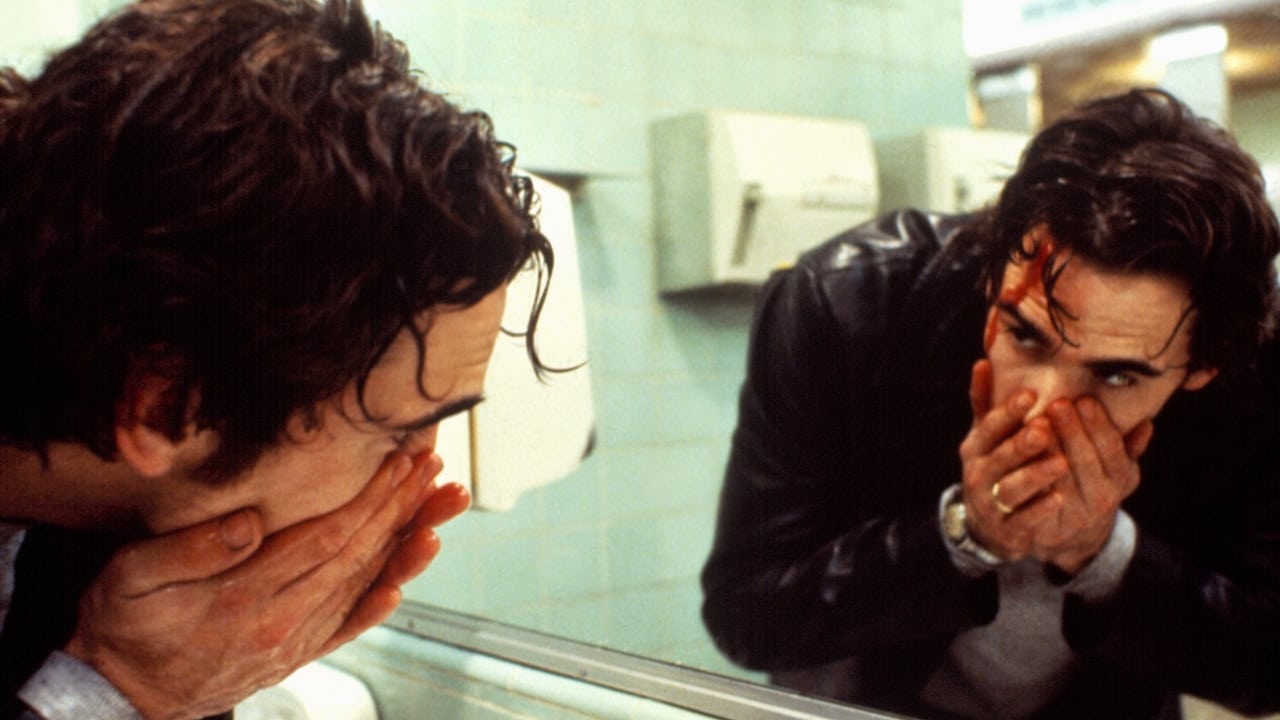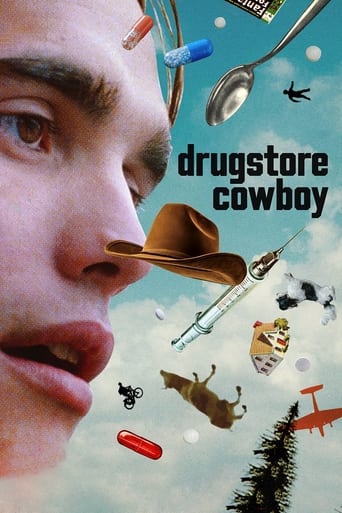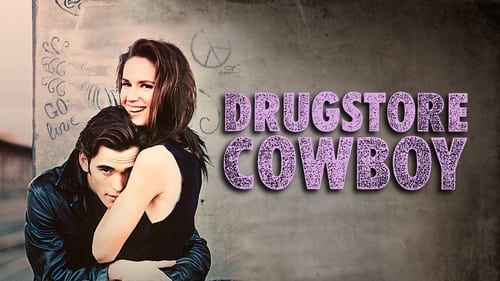



disgusting, overrated, pointless
Go in cold, and you're likely to emerge with your blood boiling. This has to be seen to be believed.
View MoreThe tone of this movie is interesting -- the stakes are both dramatic and high, but it's balanced with a lot of fun, tongue and cheek dialogue.
View MoreClose shines in drama with strong language, adult themes.
View MoreThere's an odd expectation that any drug addiction depicted in film must be filthy and decrepit. It should make no attempt at glamourising the condition at all, and with that hope it comes with the overall message of 'drugs are bad'. Drugstore Cowboy is an odd entry for this topic. Bob and his crew have been stealing from pharmacies for years and living high and on the run. Then one day he decides to stop and go clean. There is no life-changing epiphany, no stark moment of realisation. And while many movies might go at lengths to depict the hardships involved with getting clean and staying away from that toxic lifestyle, there is no such attempt here. What Van Sant does is slow the monotony of reality to an agonising pace - he gets a new job, he attends group therapy meetings, he bumps into old acquaintances and flames. The high octane mood of the former life is replaced by this droning, dull existence. The dialogue is clipped, and reduced to a snail's pace. There is less life to the performance of Matt Dillon.It is presumably from this perspective that he narrates on his former life as a drugstore cowboy. The shaky, grainy footage of their wild adventures paints a nostalgic aura around it. And he gets some details wrong too, or he was too drugged up to realise it at the time. He remembered that Dianne was more in love with dope than she was with him, as he reclines from her sexual advances, seeking to hit up yet another store for that rush. And later on, as they reconcile, he wants to once again latch onto something that resembles the past, but it is too late. It is here that William S. Burroughs' character is introduced perfectly, as the withered former priest whose eyes nevertheless light up when presented with a little stash of Bob's. His narration has a neutral ease about it; he praises the priest's generosity and endurance, but still realises that he cannot end up this way, clutching helplessly onto a bag of prescription drugs. The film has a knack for presenting the drug lifestyle's morphed perspective, and all its little personal kinks and fears and biases. There is no harsh judgement here, only a light-hearted chuckle, as if Van Sant expects us to let Bob find his own way. When he sets up the cop to get shot, his laughter is overlaid like a laugh track from a sitcom, and topped off with applause. Later the mum and dad of the drug family, so to speak, recount a tragic yet humorous story of how a little doggie led the police all the way to their hideout and stash. They collapse into tears as if the whole world was out to get them. And there is Bob's own superstition, which he treats like any other normal superstition. His mind begins to spin into paranoia after a hat is laid on a bed, and things begin to go wrong. Dramatic sequence are superimposed with goofy images of hats and various items floating around the screen - for a drug addict, this of course makes perfect sense.By his own twisted little logic, he rationalises this turn of events. It is so refreshing to see a film about a drug addict that doesn't demonise the victim, but immerses us into his perspective, and allows him the freedom to make his own choices. Van Sant dangles lures on a fishing line, as if tempting Bob back to that lifestyle, and gives him the agency he needs to become a memorable character. It is incredibly difficult to sell Bob's mournful, poignant dialogue that addresses hats on beds as if it was some mystic power shimmering beneath the surface of life, but this film pulls it off. Responsibility and understanding is born out of sickness, and we not only sympathise, but hope that he makes it and can better his future.
View MoreI have always been of the opinion that if one wants to get a basic idea of the Flower Movement and the spirit of non-conformism that engulfed the thoughts and minds of the western youth during the 1960s and 1970s, he/she just has to watch the documentaries 'Woodstock' and "Gimme Shelter' as a double feature. 'Woodstock' shows the young people enjoying themselves with talented artists and ridding themselves of the clutches of the rigid societal norms while the spirit of peace and love hangs in the air. Then we move to 'Gimme Shelter', it just feels like the evil twin sibling of 'Woodstock'. 'Gimme Shelter' just showcases the same ideals of freedom and non-conformism being abused and misinterpreted leading to absolute hooliganism and extremely regrettable consequences.The characters in 'Drugstore Cowboy' could have attended either of the two music festivals covered in the two aforementioned documentaries respectively, but there certainly exists a stronger thematic link between the characters in 'Drugstore Cowboy' and 'Gimme Shelter'. Bob and his gang are basically wanderers with no permanent address. In a world devastated by social upheavals and political chaos, these characters are lost and have no self identity. But they are still influenced by the youth rebellion and revolts and hence they don't want to conform, they'll do anything that they want without having to be answerable to anyone. Unfortunately all that they want to do is rob drugstores and get high.The film focuses on a small group of youngsters with Bob being their leader. There's his wife Dianne and the slightly younger couple Rick and Nadine. They wander from drugstore to drugstore and come up with new and inventive ways to steal the drugs. They really have no other motive in life and are not ambitious at all. They hate the customs of 'normal' life and want to distance themselves as far as possible from societal rules. Bob and Diane evens mention some superstitions which are nothing but symbols of their insecurity and fear of society catching up with them. Bob's character in this film is somewhat similar to Michael Fassbender's character Brandon in 'Shame'. They are deeply addicted to drugs and sex respectively. Bob is always thinking and fantasising about the next score and the next high, while Brandon is always thinking about the next orgasm. Having said all that, it is a tribute to Gus Van Sant's skills as a storyteller that the characters are still humanised and well developed. The screenplay co-written by Gus Van Sant, William S. Burroughs and Daniel Yost which is based on a then unpublished novel by James Fogle avoids exploiting the characters and the circumstances to generate comedy which I thought some scenes in 'Trainspotting' were guilty of. 'Drugstore Cowboy' is more in the same vein as something like 'Requiem for a Dream' where the director doesn't shy away from depicting the pathetic nature of the lives of the characters and makes them do some very objectionable things, but in the end still manages to make the viewer care about them. The only major problem that I had with the film was the somewhat overly quick change that takes place in Bob's character at the midway point of the film. The explanation for the shift was given, but I would have liked Bob to go through such a transition in a more gentle and gradual manner.Roger Ebert in his review correctly noted that 'Drugstore Cowboy' shares a thematic and stylistic resemblance with some of the other great outlaw road movies like 'Midnight Cowboy' and 'Bonnie and Clyde'. To some extent some scenes even reminded me of Scorsese's Mean Streets. Acting wise, Matt Dillon is the shining star. Others put in good performances too, but it is Dillon who carries the film on his shoulders. His masculine charm and appeal reminded me of Stallone in the first Rocky. But even with the charm, Dillon still manages to exude vulnerability and depth to a character who is struggling to find his place in the world.The ending to the film is rich with irony. It clearly establishes how life can be so unpredictable, mysterious and harsh. The characters in the film clearly took up drugs and their lifestyle to escape the unpredictability and the harshness of real life, but they forgot that life's realities always have a way of catching up with you no matter how hard you try to escape them.
View MoreFrom director Gus Van Sant (My Own Private Idaho, Good Will Hunting), I am sure that I tried of few minutes of this film and got bored, but having remembered the title for so long I was definitely willing to give it more of a chance. Basically highly suspicious Bob Hughes (Matt Dillon) and his wife Dianne (Kelly Lynch) are drug addicts, and are love doing various pharmaceutical drugs, like dilaudid, morphine and cocaine, and keep their habit going they and another couple often steal from pharmacies. They are aware a police officer is getting too close for comfort for them, so they move their operation to another town, but it isn't long after doing this that one of the crew overdoses and dies. They unintentionally have checked into a hotel where a sheriff's convention is taking place, but they do have to move the body from out of the hotel room to into their car, they narrowly avoid getting caught doing this. Believing his warnings is what caused the incident Bob decides he does need help, but he is too scared to join any methadone or any kind of drug eliminating program. Worse comes when junkies he saw earlier ambush his apartment and try to score drugs, and having decided to go straight he doesn't have anything for them to take, so they beat up and then shoot him, but in the end he lives long enough for an ambulance to take him away. Also starring James Remar as Gentry, James Le Gros as Rick, Heather Graham as Nadine, Beah Richards as Drug Counselor, Grace Zabriskie as Bob's Mother and Max Perlich as David. Dillon does well as the junkie who finds it very difficult to let go of his addiction and then later to even try to kick it, I admit I didn't feel as enraptured in this story like I did with Trainspotting, but the drug taking culture is definitely emphasised, not in a judgemental way, and there is interesting provocative material, so all in all it is a worthwhile drama. Very good!
View MoreWatching a quartet of teenage junkies rob pharmacies and get high may not be everyone's idea of a good time. But director Gus Van Sant looks beyond the desperate urge for another fix and finds a good deal of insight into the addict's pursuit of slow death in the fast lane, with Matt Dillon giving a memorable performance as the leader of the sometimes comically pathetic outlaw gang. Van Sant's unflinching depiction of the junkie lifestyle is entirely sympathetic but totally unsentimental, showing the non-conformist need for a high without ever glamorizing the drug culture. The episodic story is set (and with good reason) in the year 1971, after the mysticism of experimentation had long since become the grim reality of addiction, but it loses some momentum after Dillon enters a rehabilitation clinic, at which point the film attempts to express verbally what it already proved it could show visually. But the script never sells out for any tidy moral lesson, and the presence of Beat Generation icon William Burroughs in a small but notable cameo role lends a measure of credibility to Van Sant's intentions.
View More